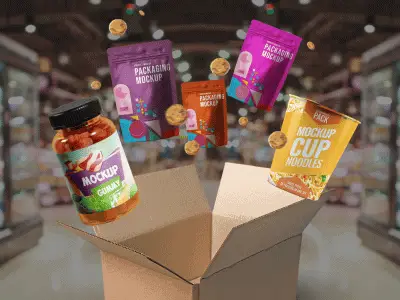 When it comes to contract food packaging, it’s essential to choose the right type of packaging for your business needs. Packaging not only plays a pivotal role in protecting your food products but it also serves as a powerful marketing tool.
When it comes to contract food packaging, it’s essential to choose the right type of packaging for your business needs. Packaging not only plays a pivotal role in protecting your food products but it also serves as a powerful marketing tool.
Two main categories of food packaging include retail packaging and non-retail packaging. Here, we’ll explore the differences between these two types so that you can make an informed decision when selecting the right option for your food products.
Key Differences Between Retail Vs. Non-Retail Packaging
Some of the key differences between retail and non-retail packaging include:
1. Appearance and Design
Retail packaging is specifically designed to make your product look appealing on a store shelf. It’s intended to catch a consumer’s attention, communicate your brand identity, and increase the likelihood of sales. As such, this packaging option often includes bright colors, unique shapes, and eye-catching graphics.
On the other hand, non-retail packaging is purely functional. Its main purpose is to ensure safe storage and transport of food products. For this reason, it typically features a more straightforward, utilitarian design.
2. Functionality
In terms of functionality, retail packaging is meant to showcase your products, enhance visual appeal, and create an improved unboxing experience for customers. Non-retail packaging prioritizes protection over aesthetics – its main goal is to make sure your product arrives at its destination intact.
3. Materials Used
The materials used for retail packaging are chosen with aesthetics in mind. Common materials include plastic, cardboard, and glass. With non-retail packaging, materials are chosen based on durability and protection. Typical options include corrugated cardboard, bubble wrap, and foam.
Pros and Cons of Retail Packaging Vs. Non-Retail Packaging
When choosing between retail packaging and non-retail packaging, it’s important to consider the pros and cons of each option.
Retail Packaging
Advantages of retail packaging include:
- Improved brand visibility. Retail packaging can be used as a powerful branding tool. It helps your food products stand out from the competition and makes your brand more recognizable. Retail packaging can also include custom packaging design to give it extra personality.
- Marketing and promotion opportunities. Retail packaging designs can include creative marketing elements such as promotional information, slogans or taglines, and product images.
- Customized protection for sensitive products. Retail packaging can include customized protective features designed to prevent product damage during storage and handling.
Disadvantages of retail packaging include:
- Higher costs. Because retail packaging often includes more specialized elements, it can come with higher printing, material, and design costs.
- Environmental concerns. The heightened focus on branding and aesthetics sometimes comes at the cost of eco-friendliness. This can lead to concerns surrounding sustainability and waste.
- Limited reusability. Retail packaging often comes in single-use designs, further raising environmental concerns.
Non-Retail Packaging
Key benefits of non-retail packaging include:
- Cost-effectiveness. Non-retail packaging is typically more affordable than retail packaging, making it an attractive option for businesses with budget constraints.
- Eco-friendly options. Many non-retail packaging materials are recyclable and eco-friendly, aligning with increasing demands for more sustainable products.
- Space efficiency. Non-retail packaging provides improved space efficiency during storage and transport, resulting in lower shipping costs.
Some drawbacks of non-retail packaging include:
- Limited branding and marketing potential. Compared to retail packaging, non-retail packaging doesn’t offer the same branding opportunities. It is more focused on functionality rather than marketing and aesthetics.
- Limited protection for fragile items. Non-retail packaging often isn’t tailored to the specific product, resulting in less protection for more sensitive items.
- Less appealing presentation. Non-retail packaging doesn’t include the same design elements as retail packaging, meaning it may not attract customers in the same way.
Retail Packaging Vs. Non-Retail Packaging Selection
Choosing between retail packaging and non-retail packaging requires paring down your product and industry. Certain industries or retail outlets have a higher expectation for attractive packaging. Your target market and customer preferences have a similar influence on the type of packaging you choose. Other factors to consider when making your choice include:
- Budget
- Sustainability goals
- Desired branding opportunities
Sustainability for Retail Packaging Vs. Non-Retail Packaging
The importance of sustainable food packaging cannot be overlooked. As consumer demands for environmentally friendly packaging options continue to grow, it’s more important than ever to prioritize eco-conscious choices when packaging your food products. Both retail and non-retail sustainable packaging design can be incorporated by using recyclable materials, looking for ways to reduce waste, and using responsible manufacturing practices.
Learn More About Retail Packaging Vs. Non-Retail Packaging
Choosing between retail and non-retail packaging requires a thorough analysis of your shipping, storage, and retail needs. The key difference is generally one of function vs. form, where retail packaging depends on appearance and improving the customer experience, while non-retail packaging should be efficient and durable.
At Econo-Pak, we’re your source for superior contract food packaging services. Whether you choose retail or non-retail packaging, our expert team can work with you to create a sustainable, durable, and high-quality packaging solution for your food products. For more information about our retail and non-retail packaging capabilities, request a quote today.

